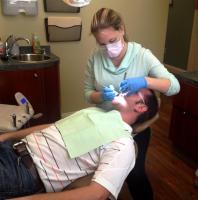Career Path Has Led Her To Jail, State Hospital

Dr. Shea Perkins admits that when she was a college student 10 years ago she would have laughed at the notion of having a job working with inmates in a jail or with patients in a mental hospital.
But the traits of her grandmother and her mother -- traits of helping those less fortunate and doing it very kindly -- appear to have been passed on to her.
That's why one day each week she takes a break from her private dental practice, and provides dental care at the Vanderburgh County jail and at the Evansville State Hospital.
She grew up in Newburgh, and attended St. Benedict Cathedral School in Evansville and then Reitz Memorial High School, which was down the street.
She earned a degree in chemistry from Bellarmine University, and then enrolled in the dental school at the University of Louisville. She loved the city of Louisville, but she felt a strong tug to come back to Evansville, especially from her maternal grandmother, Joyce Isbill.
When Dr. Perkins first returned to Evansville, she was busy setting up a private dental practice in Newburgh. Then, through her mom's contacts, she was offered a part-time job at the state hospital. At first, it was just a job. "Then I started getting attached to the patients. Now I can't imagine leaving them. I don't know who would take care of them.
"I never saw them as different," she says, "and we did well together. I talked to them, and I showed an interest in things they had an interest in."
Her patients include the developmentally disabled, geriatric patients and a small group of criminally insane who are considered incompetent to stand trial.
While she has a comfort level now, she remembers the day she first arrived. Her tour guide was about six foot four inches tall with swastika tattoos. "I thought, 'I can't do this,' but he was as sweet to me as could be."
As the patient-dentist relationships have developed "they’ve taken an interest in my life, and I take an interest in whatever they are up to."
The patients receive whatever dental care they need, including cleanings, fillings, dentures and extractions.
"People think the state hospital is like the 'Cuckoo's Nest' but it's not. You have a range. You have people with personality disorders, the elderly with dementia. One patient thinks we went to grade school together. You do the best you can with their care."
She had been working at the facility for a while when she received a call from the Vanderburgh County jail. Someone there had heard about her work at the state hospital, "that I was not intimidated by a high-risk population or by high-risk behaviors."
She was offered a part-time job at the jail, and she accepted. Her work there was different. At the jail, she only does extractions, and there is always an armed guard present when she is working. Some of her patients "are not the nicest people," although "most of them are very polite, and say, 'Thank you, ma'am,' and 'Yes, doctor.'"
Many of her patients at the jail have never had dental care of any kind. "Most of them have never seen a dentist."
At the jail, she is seeing the result of the meth problems in the community. "Meth eats the enamel off the teeth and leaves a mushy nub where the tooth was. When people are on meth, they develop bad habits, like staying up 24 to 48 hours and drinking high sugar drinks."
During an appointment, she may remove six to eight teeth at a time. "They come back for six visits, and they have no teeth at the end of it."
As she works with the inmates, she says, "I try not to judge. They are still people. I try not to look at what they've done," she says, adding, "I've seen it all. People are there because they didn't pay child support, to people who have killed children."
Over the years she learned -- both in her family and in her Catholic school training -- that "we are all still people." She has come to learn "a person can be living a happy, healthy normal life, or someone may have committed a crime, or someone may be mentally ill – but we are all still people."
She credits her grandmother and her mother with teaching her those life lessons. "My grandmother worked as a bookkeeper at the Evansville Children's Psychiatric Center for 28 years, and my mom is a nurse -- a very kind nurse, no matter who it was.
"As a Catholic, I was taught everyone is the same -- and to treat them the same because we are all the same."
Sometimes the inmates will talk about what they have done to merit a stint in the jail. "I tell them, 'Everyone gets a second chance. Get out of here and do better.'" She believes sometimes "good people get into bad situations because they are bad decision makers."
She laughs at the memory of herself as a college student. "If someone told me 10 years ago that I would be working at the jail and at the state hospital . . .
"I felt like I was meant to do this." The work has "helped shape who I am. I'm not bleaching and doing veneers all the time.
I'm also with people who need the help."

